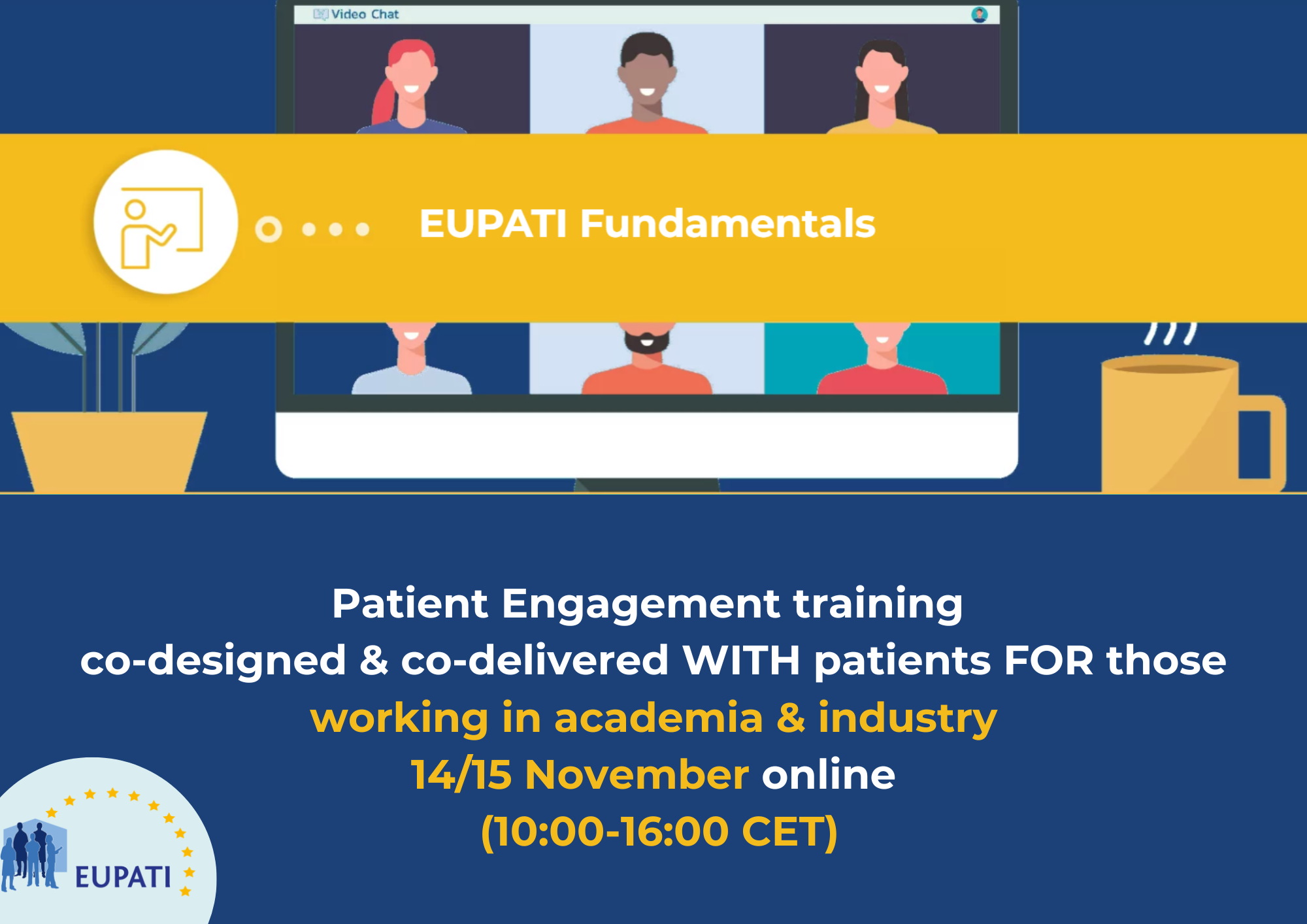
The next EUPATI Fundamentals Training is taking place online 14 & 15 November (10.00 – 16.00 CET). Register today to secure your spot!
EUPATI Fundamentals is a successful patient engagement training course aimed at those working in academia and industry. This training has been running for almost 4 years both online and F2F and has educated over 196 trainees on the basics of patient engagement.
Why is this topic so important for academia and industry members? What is unique about this training? And what would those who are involved in this training say to potential participants? We recently asked two of our expert trainers who will be delivering the upcoming training Tamás Bereczky and Inês Alves about why this training is a must for people working in the patient engagement field.
Why is the topic of patient engagement important for the industry/academia?
Tamás: Patient involvement has become an important trend for industry and academia for reasons more than just that it is ethically the right thing to do. There are measurable benefits that arise from patient involvement, and some research has already been published that provides evidence for such benefits. Most importantly, the entire research and development process will speed up, and the results, i.e., the new product/treatment on the market will be more relevant if the patients, who are the ultimate users of the new product, can make an input into the development of that product/treatment.
Inês: Patients are the essential stakeholder in healthcare. Patient engagement is a fundamental pillar of research and development (R&D). It can influence on the quality of treatment decisions and quality of care outcomes.
How does EUPATI Fundamentals Training help industry/academia to better understand the principles of patient engagement?
Tamás: The EUPATI Fundamentals Training course explains the most important terms and concepts in patient involvement across the medicines R&D spectrum. Going beyond the usual approach of understanding involvement in the later stages, which has become rather standard, the course also explains and urges early involvement. The theory described and discussed in the course is leveraged by practical exercises. We the trainers give preference to discussions and answering the participants’ questions over talking through all the slides.
Inês: The EUPATI Fundamentals Training is a translational like process from theoretical concepts to practical examples on patient engagement and as it is facilitated by patient experts, industry professionals, clinicians, and researchers with a vast experience in patient engagement, it goes beyond just being a training.
What are the main expected learning outcomes from this training?
Tamás: The participants are expected to understand and appreciate the unique patient viewpoint. They will gain better understanding of the value and importance of working with patients in a meaningful co-creation process. The participants will also gain more insight into how patient groups and organisations work, and how one can get in touch with patients. Many practical aspects of cooperation and co-creation are discussed and explored.
Inês: Understanding the interventional role and significance of input of patients in R&D and how collaborative work can be conducted in a patient-focus settings.
What are the highlights of the training in your view?
Tamás: The highlights include a unique insight into how patients think and work, and how this differs from what one would expect from a traditional third-party vendor that supplies the pharmaceutical industry. Also, we are stunningly knowledgeable and (mostly) very funny.
Inês: The practical exercises with a significant level of real experiences sharing and exchange of ideas between participants. This part of the training is a relevant step towards clarifying multiple possibilities in patient engagement and outcomes in R&D.
What is unique about this training?
Tamás: Literally everything is different about this training. Instead of fancy slide decks and technology heavy presentations we focus on bringing across what it means to work with patients, and it can be done meaningfully. EUPATI materials are unique because they have been developed in close and meticulous cooperation across all stakeholder groups involved in medicine R&D. And so, EUPATI trainings don’t stop at explaining the patients’ perspective, but they also consider very carefully what the industry or academic researchers can and should do, what is expected from them. Thus, the trainings are really dialogues and discussions focusing on the practical aspects instead of delivering lengthy theoretical sermons.
Inês: The level of involvement and experience of trainers as well as the enthusiasm and safe questions setting training for trainees is what makes this training different.
What would you like to say to potential participants?
Tamás: Come, join us, find out, bring your questions, challenge us. We are not afraid of a good discussion, and we are confident that we can convince you about the true value of co-creation and patient involvement beyond meeting your annual targets. It will all make sense in the end!
Inês: Hundreds of the highly participative and involved patient experts have been trained as EUPATI Fellows. And hundreds of industry professionals and researchers that took the EUPATI Fundamental Training developed higher level skills on patient engagement. Take part!
Convinced yet this is the training for you? Register now and get involved to have a meaningful input into the medicines R&D process.
More information about our trainers can also be found on our Learning Lab page of our website.
Date posted: September 12, 2023
Categories: Uncategorized



